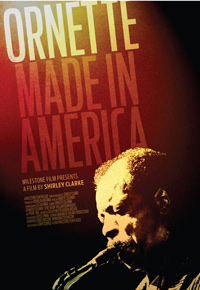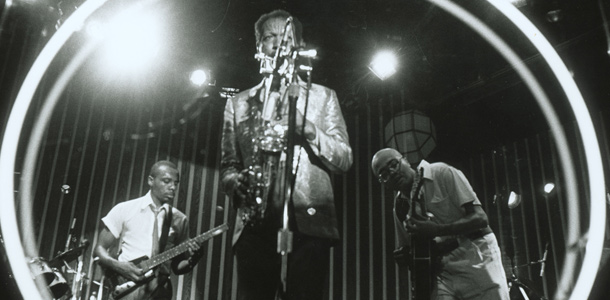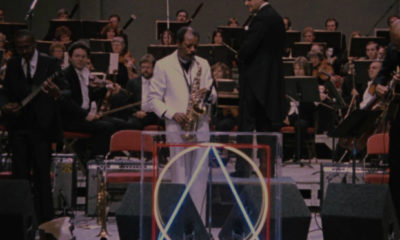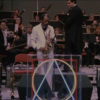Reviews
Ornette: Made in America | Review
A high point for U.S. manufacturing: Jazz genius Ornette Coleman
 Shirley Clarke’s 1984 documentary ‘Ornette: Made in America’ is a portrait of music visionary and harmolodic high priest Ornette Coleman, a “free jazz” saxophonist and composer who for many decades bewildered even most free jazzers with his courageous, uncornered, acausal, ascendant, sentient sound. ‘Made In America’ provides a chance to see rare live performances of Coleman’s legendary 70’s & 80’s band Prime Time, and goes as far as could be expected in revealing a personality that will always remain, as with any wise seer, fundamentally inscrutable to mere mortals. Coleman doesn’t fit into orthodox narratives of jazz’s evolution; more Messiaen than Mingus, he has always stood apart, beyond. Or as Coleman, with his signature humility, explains, “there’s no up and down — there’s only out.”
Shirley Clarke’s 1984 documentary ‘Ornette: Made in America’ is a portrait of music visionary and harmolodic high priest Ornette Coleman, a “free jazz” saxophonist and composer who for many decades bewildered even most free jazzers with his courageous, uncornered, acausal, ascendant, sentient sound. ‘Made In America’ provides a chance to see rare live performances of Coleman’s legendary 70’s & 80’s band Prime Time, and goes as far as could be expected in revealing a personality that will always remain, as with any wise seer, fundamentally inscrutable to mere mortals. Coleman doesn’t fit into orthodox narratives of jazz’s evolution; more Messiaen than Mingus, he has always stood apart, beyond. Or as Coleman, with his signature humility, explains, “there’s no up and down — there’s only out.”
Renowned critic Gary Giddins once wrote that, “Nothing in jazz is more moving than the purity of Coleman’s sound and conception.” It follows that the highlight of the doc is the music. Clarke returns repeatedly to one performance, in a newly minted concert hall in Coleman’s hometown of Fort Worth, TX, of his large-scale composition ‘Skies of America,’ in which a full symphony orchestra provides a woozy background of sea-swelling anxiety as Prime Time battles in fits and starts to stir the primary impulses of life. ‘Skies’ might be described as the score for an epic, faithful, unfilmable movie version of ‘Moby Dick.’
For too much of the movie, Clarke unnecessarily splatters the audience with distracting gimmicks, as if she’s afraid of losing their attention. After being subjected to clunky re-enactments of scenes from Coleman’s childhood, cheesy video-game animations, and strobe-like editing that is more amateurish than avant-garde, some viewers may be tempted to close their eyes and just listen.
To her credit, Clarke scrupulously avoids a book report-style official biography. Her non-linear structure reflects the liberating openness of Coleman’s music, but her quick cuts in and out from various live performances violates the immersiveness of his sound. New listeners need some time to get on his wavelength (again from Giddins: “I loved Coleman before I liked him.”), while acolytes want to hear everything in its entirety. Listening to Prime Time is like being God listening to the world. It forces you into omniscience, into hearing everything at once. When you get there, linear time ceases, leaving only space. But this rare glimpse of immortality can’t be reached through sound bytes.
Clarke makes a rare concession to doc viewers who require an “expert” imprimatur to justify their interest by including a music critic who relates that Coleman, while toiling on the club circuit in the 50’s, would sometimes play in a bebop style “like no one else but Charlie Parker could have.” When asked why he didn’t always play like that, Coleman supposedly shrugged off the idea with, “I’m just playing around.”
Coleman doesn’t require such ‘Amadeus’-style romanticizing to validate his genius, though he himself seems incapable of getting uptight about such contrivances. With his simple sincerity, he seems to have been born immune to trivial griping. Even the casual asides he shares for the camera unwittingly take on the quality of sacred medieval allegories. It might be an ascetic saint telling us about how he wanted to rid himself of all carnal desire, and requested castration. But when the symbolic gesture of circumcision suggested by his interlocutor fails to dampen the sexual impulse, a contemplative Coleman comes to the cryptic revelation that “there is male and man, and woman and female.”
Though Coleman hasn’t reunited the Prime Time band in a long while, former members Jamaaladeen Tacuma, Bern Nix, and Calvin Weston occasionally play together as The Young Philadelphians, a group formed by inimitable guitarist Marc Ribot (who’s 90’s band Shrek was heavily inspired by Prime Time’s records). Animating Philly soul-funk with the spirit of Prime Time’s telepathic improvisations, the garrulous Philadelphians follow Coleman’s lead in not quite sounding like anything else on the planet.































